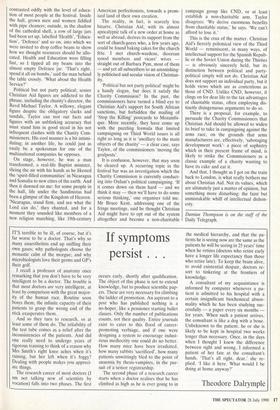If symptoms persist . . .
IT'S terrible to be ill, of course, but it's far worse to be a doctor. That's why so many anaesthetists end up sniffing their own gases; why pathologists choose the monastic calm of the morgue; and why microbiologists love their germs and GP's their golf.
I recall a professor of anatomy once remarking that you don't have to be very intelligent to be a doctor. The trouble is that most doctors are very intelligent, at least by comparison with the great major- ity of the human race. Routine soon bores them; the infinite capacity of their patients to grasp the wrong end of the stick exasperates them.
And so they turn to research, or at least some of them do. The reliability of the test tube comes as a relief after the inconsistencies of the patients. And did one really need to undergo years of rigorous training to think of a reason why Mrs Smith's right knee aches when it's raining, but her left when it's foggy? Dealing with people makes you appreci- ate things.
The research career of most doctors (I am not talking now of scientists by vocation) falls into two phases. The first
occurs early, shortly after qualification. The object of this phase is not to extend knowledge, but to produce scientific pap- ers. These are very necessary for climbing the ladder of promotion. An aspirant to a post who has published nothing is a no-hoper, like a pensioner starting ballet classes. Only the number of publications counts, not their quality. Entire journals exist to cater to this flood of career- promoting verbiage, and if one were designing a system to encourage indust- rious mediocrity one could do no better. How many mice have been irradiated, how many rabbits 'sacrificed', how many patients unwittingly bled to the point of anaemia by thesis-vampires, in the pur- suit of a senior registrarship.
The second phase of a research career starts when a doctor realises that he has climbed as high as he is ever going to in the medical hierarchy, and that the pa- tients he is seeing now are the same as the patients he will be seeing in 25 years' time when he retires (doctors who retire early have a longer life expectancy than those who retire late). To keep the brain alive, to avoid existential despair, doctors re- sort to tinkering at the frontiers of knowledge.
A consultant of my acquaintance is informed by computer whenever a pa- tient is admitted to his hospital with a certain insignificant biochemical abnor- mality which he has been studying suc- cessfully — a paper every six months for years. When such a patient arrives, the consultant is like a dog with a bone. Unbeknown to the patient, he or she is likely to be kept in hospital two weeks longer than necessary. Once, in the days when I thought I knew the difference between right and wrong, I informed a patient of her fate at the consultant's hands. 'That's all right, dear,' she re- plied. 'I like it here. What would I be doing at home anyway?'
Theodore Dalrymple


















































 Previous page
Previous page